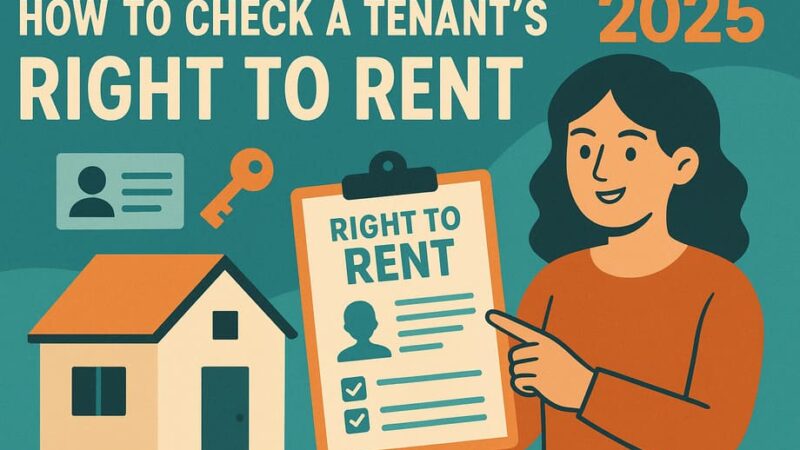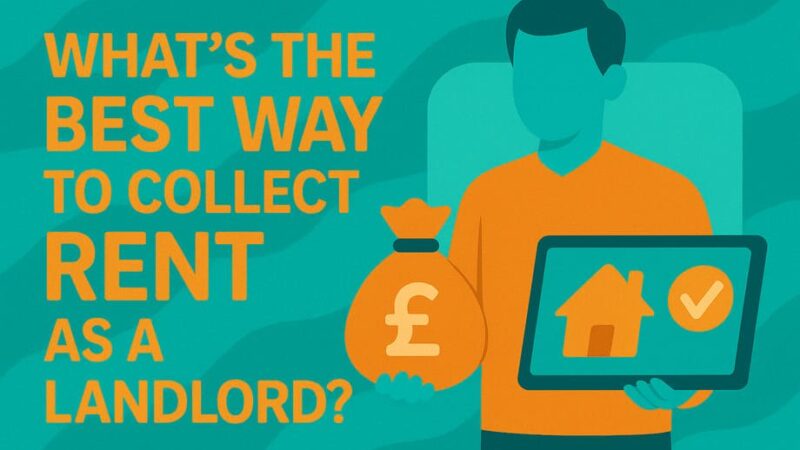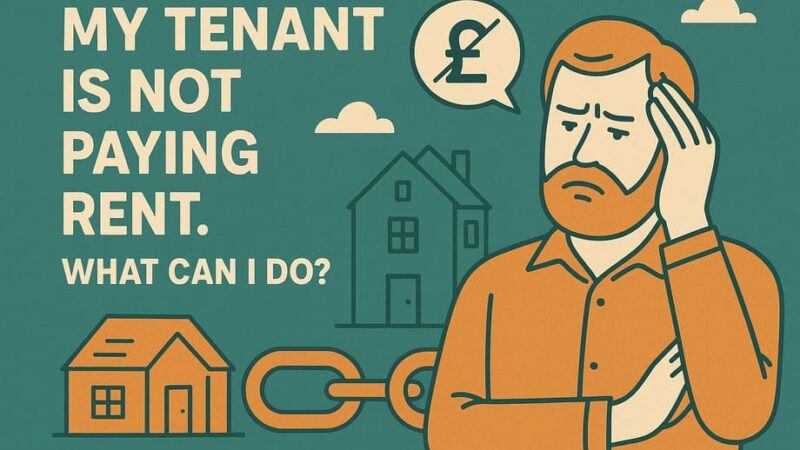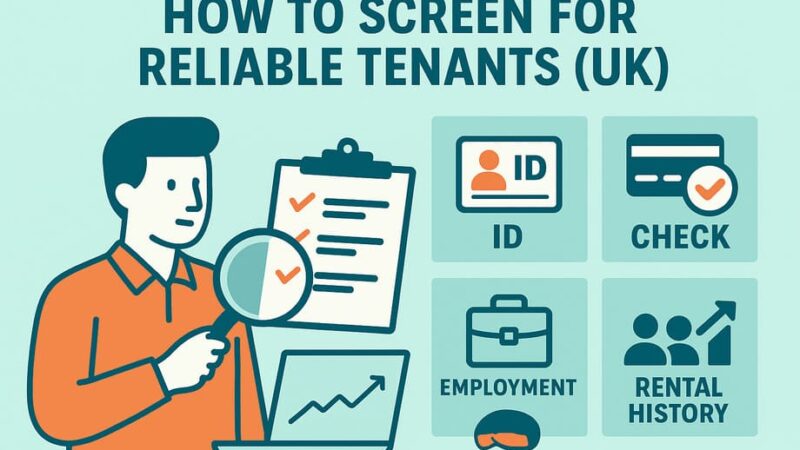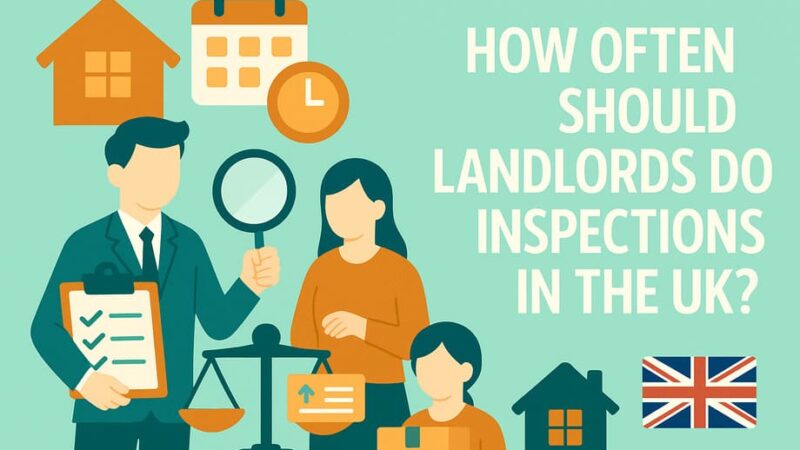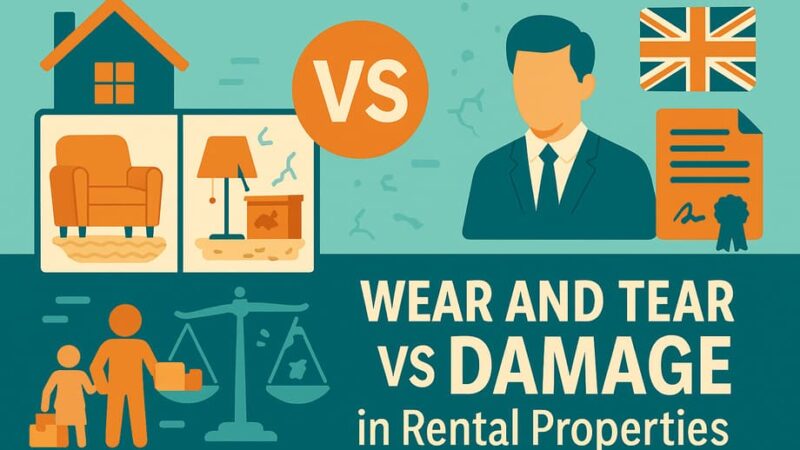Costs of Being a Landlord in the UK – What You Need to Know
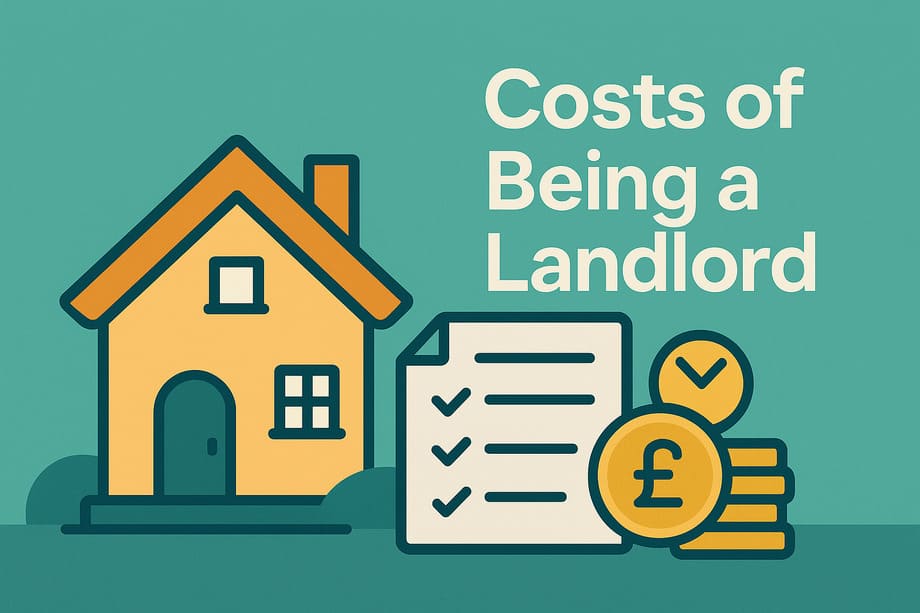
Thinking about becoming a landlord? While rental income can seem attractive with UK average monthly rent at £794, and in London a whopping £1,665, the reality is far more complex. One in eight prospective landlords underestimates all the costs that come with buying to let – by as much as £8,359 a year.
Don’t let yourself become another statistic. Whether you’re considering your first buy-to-let property, inheriting a rental property, or looking to expand your portfolio, understanding the true costs of being a landlord will help you make informed decisions and avoid financial pitfalls.
This comprehensive guide breaks down every cost you’ll face as a landlord, from obvious expenses to hidden ones that catch many by surprise.
What Are Landlord Costs?
Not all landlords chose to have a buy to let property – some were thrown in at the deep-end with the financial crisis years ago. Others may have inherited property and fancy the idea of receiving a decent rental sum every month, but there’s far more involved in being a landlord than that.
Landlord costs fall into several categories:
Upfront Costs: Purchase expenses, deposits, legal fees, and initial setup
Legal and Compliance Costs: Safety certificates, licenses, and mandatory requirements
Ongoing Operational Costs: Mortgage, insurance, management fees
Variable Costs: Maintenance, repairs, void periods, and tenant-related expenses
Tax Obligations: Income tax, stamp duty, and accounting costs
Getting a clear picture of these costs is essential because the average UK landlord now spends £1,374.07 per year on maintenance—£285 more per year compared to 2022, and that’s just one category of expenses.
Upfront Purchase Costs vs Ongoing Costs
What Are Upfront Purchase Costs?
Upfront purchase costs are the one-time expenses you’ll face when buying a rental property. These are significantly higher for buy-to-let properties compared to residential purchases.
When you’ll face upfront costs:
- Buying your first rental property
- Expanding your property portfolio
- Converting an existing property to rental use
- Taking over inherited property that needs compliance work
Key features:
- Much higher deposit requirements (usually 20-25% minimum)
- Additional stamp duty surcharge for second properties
- Higher mortgage arrangement fees and interest rates
- Legal and survey costs
What Are Ongoing Operational Costs?
Ongoing operational costs are the regular expenses you’ll face throughout your time as a landlord. These include both predictable monthly costs and variable expenses that can fluctuate significantly.
When ongoing costs apply:
- Every month you own a rental property
- Whether the property is occupied or vacant
- Regardless of rental income levels
- Throughout the entire period of ownership
Key features:
- Monthly mortgage payments (typically higher interest than residential)
- Annual safety certificates and compliance requirements
- Insurance premiums and management fees
- Unpredictable maintenance and repair costs
Do I Need to Budget for All These Costs?
You Need a Comprehensive Budget If:
- You’re buying your first rental property
- You want to maintain legal compliance and avoid penalties
- You’re planning to generate consistent profit from rental income
- You want to protect yourself from unexpected financial strain
- You’re considering professional property management
You Can Reduce Some Costs If:
- You’re comfortable with self-management instead of using agents
- You have DIY skills for basic maintenance (though be cautious)
- You choose newer properties that require less maintenance
- You’re selective about tenants to reduce damage and disputes
- You buy in areas with lower compliance requirements
You Must Budget for Legal Costs If:
- You own any rental property in the UK
- You want to avoid prosecution for non-compliance
- Your property has gas appliances, electrical systems, or requires licenses
- You handle tenant personal data (almost all landlords)
What Costs Should Be Included in My Budget?
Legal and Compliance Costs (Non-Negotiable)
Safety Certificates:
- Gas safety certificate: £45 per year (annual requirement)
- Energy Performance Certificate: £65 every 10 years
- Electrical Installation Condition Report: £199 every 5 years (England)
- Smoke and carbon monoxide alarms: £30 (one-time plus replacements)
Registration and Licensing:
- Registration: In Scotland, the cost is currently £65 plus £15 for every additional property
- ICO registration: £40, and you’ll have to renew it every year
- HMO licence: In Edinburgh, this can range from £540 (for three tenants) to £900 (for five tenants)
Tax Obligations:
- Stamp Duty Land Tax with additional surcharge for second properties
- Income tax on rental profits (20%, 40%, or 45% depending on total income)
- Accounting and self-assessment costs
Purchase and Financing Costs
Buy-to-Let Mortgages:
- Deposit: Usually 20-25% minimum (vs 5% for residential)
- Arrangement fee: 1%–2% on average of your mortgage, or £1,504 on average as a flat fee
- Booking fees: £99 and £250
- Valuation fees: Usually £150 or more
- Higher interest rates than residential mortgages
Legal and Professional Fees:
- Solicitors’ fees: £850 and £1,500
- Survey costs for detailed property inspection
- Stamp duty with additional 3% surcharge for second properties
Ongoing Operational Costs
Insurance:
- Buildings insurance: average £111.83 a year
- Insurance costs start from £16 per month amounting to around £192 per year
- Additional landlord insurance for liability and rental income protection
- Contents insurance for furnished properties
Management and Administration:
- Letting agent fees: between 8 – 14% of the monthly rental income
- Average fees tend to range between 10-20% of monthly rent plus VAT
- Tenant finding services if self-managing
- Tenant acquisition: around £50 for online advertising
- Tenant referencing: start at £20
How Much Should I Budget for Maintenance?
Setting Realistic Maintenance Budgets
Current Market Reality: Property maintenance costs have soared by 26.24% since 2022, making accurate budgeting more crucial than ever.
Average Annual Costs:
- UK landlords spend an average of £765 a year on maintenance
- Research suggests you should save 1% of your property’s value for maintenance costs
- This is an average cost of £2,344 across the country – much higher in expensive areas like London
Most Expensive Repairs:
- Roof damage – £906 on average (needed once every three years)
- Electrical issues – £665 annually (at least once a year)
- Heating problems – £655 annually (at least once a year)
What Affects Maintenance Costs
Property Age and Size:
- Larger the property, the more it costs to run
- Older houses are more expensive to maintain because they often have old-fashioned features which aren’t as cheap to repair
Damage and Wear: The average cost of repairing damage has skyrocketed by 121%, from £473 in 2022 to £1,043 in 2024
Most expensive damage causes:
- Theft damage – £1,128 per year
- Fire damage
- Heat and weather-related damage
Common Mistakes to Avoid
Underestimating Total Costs
Don’t Assume Low Ongoing Costs:
- Many new landlords focus only on mortgage payments and rent income
- Confession time! I’m going to make a shameless confession before I go any further: before I became a landlord, I had no real idea what the associated costs were
- Factor in all categories: legal, operational, maintenance, and tax costs
Don’t Ignore Regional Variations:
- Edinburgh emerging as the most expensive city for maintenance, followed by Newcastle and Glasgow. London, once the costliest city for landlords, has now dropped to sixth place
DIY Repairs Gone Wrong
The DIY Trap: 53% of UK landlords have attempted to fix property damage themselves, yet 43% regret it due to poor results, further damage, or tenant complaints. Alarmingly, 46% of landlords who tried DIY solutions later had to pay professionals to redo the work, often at a higher cost
When to Use Professionals:
- Gas, electrical, and structural work
- Major plumbing repairs
- Anything affecting tenant safety
- Work that requires certification
Missing Legal Requirements
Common Oversights:
- Forgetting annual gas safety checks
- Not registering with ICO for data protection
- Missing local licensing requirements
- Inadequate insurance coverage
Legal Consequences:
- Prosecution and fines for safety violations
- Inability to serve eviction notices without proper certificates
- Personal liability for accidents
Where to Get Cost Estimates
Professional Services
Mortgage and Financial Advice:
- Independent mortgage brokers for buy-to-let options
- Accountants for tax planning and compliance
- Property investment advisors for market analysis
Property Services:
- Local contractors for maintenance cost estimates
- Property management companies for service comparisons
- Insurance brokers for comprehensive coverage quotes
Online Resources
Cost Calculators:
- Stamp duty calculators for purchase costs
- Rental yield calculators including all expenses
- Mortgage calculators specifically for buy-to-let
Market Research:
- Local rental market analysis
- Property price trends in your target area
- Comparative management fee analysis
Getting Professional Help
When to Consider Expert Advice:
- First-time landlords unfamiliar with requirements
- Complex tax situations or multiple properties
- Properties requiring significant compliance work
- High-value properties with substantial risks
What Happens When Costs Spiral?
Void Periods – The Silent Killer
Impact of Vacant Properties: Obviously, a vacant property means zero rental income. Hard to anticipate, a void period could be as little as a week or could go on for many months
Ongoing Costs During Voids:
- The average Band D council tax in England for 2024-25 is £2171 (approximately £180 monthly)
- Mortgage payments continue
- Insurance premiums
- Utility costs if not transferred
Tenant Disputes and Legal Costs
Rising Disputes: Nearly 60% of landlords have had disagreements with tenants over maintenance, a sharp rise from 48.5% in 2022
Legal and Eviction Costs:
- Professional legal advice
- Court costs and bailiff fees
- Lost rental income during proceedings
- Property damage that exceeds deposits
Emergency Repairs
Unexpected Major Expenses:
- Boiler replacement (£2,000-£4,000)
- Roof repairs (£3,000-£10,000+)
- Major plumbing emergencies
- Electrical system upgrades
Protecting Yourself:
- It’s essential to have a financial buffer to cover mortgage payments, council tax, and other ongoing expenses during these periods of vacancy
- Comprehensive insurance coverage
- Regular property maintenance to prevent emergencies
- Professional property management for quick response
Tax and Financial Considerations
Income Tax on Rental Profits
Tax Rates for 2024/25: Personal Allowance: £0-£12,570 (0%), Basic Rate: £12,571-£50,270 (20%), Higher Rate: £50,270-£125,140 (40%), Additional Rate: Above £125,140 (45%)
Mortgage Interest Relief Changes
Section 24 Changes: Mortgage interest is no longer deductible but you can claim back up to 20% of the mortgage interest back in tax relief
This has significantly impacted landlord profitability, especially for higher-rate taxpayers.
Professional Tax Advice
Accounting Costs:
- For this service, you can expect prices to start from around £220 per property
- Starting April 2026, landlords who file a self-assessment will be required to submit financial reports quarterly
Allowable Expenses: Many landlord costs are tax-deductible, including:
- Maintenance and repairs
- Insurance premiums
- Management fees
- Safety certificates
- Professional fees
Regional Cost Variations
Location-Specific Expenses
Highest Maintenance Costs: Edinburgh emerging as the most expensive city for maintenance, followed by Newcastle and Glasgow
Licensing Requirements:
- In Edinburgh, landlord registration costs £80 plus £18 for each property
- Different HMO licensing requirements across regions
- Varying local authority requirements
Market Factors:
- Property values affecting insurance costs
- Local contractor pricing
- Demand affecting void period risks
Annual Cost Summary: What to Expect
Based on our research, here’s what you can realistically expect to spend annually per property:
Mandatory Annual Costs
- Gas safety certificate: £45-£60
- ICO registration: £40
- Buildings insurance: £112-£192
- Income tax: Varies significantly based on income and property profits
Variable Annual Costs
- Maintenance and repairs: £765-£1,374+ (and rising)
- Management fees: 8-14% of rental income (if using agents)
- Void periods: Highly variable but potentially several months of costs
- EPC (amortized): £6.50 per year
- EICR (amortized): £40 per year
Total Estimated Annual Costs
Self-managed property: £2,000-£4,000 Agent-managed property: £3,500-£6,000+
High-maintenance/older properties: £4,000-£8,000+
These figures exclude mortgage payments, which will be your largest regular expense.
Building Your Contingency Fund
The Importance of Emergency Funds
One of the biggest mistakes most new landlords make is that they don’t put measures in place to deal with unforeseen expenses. Being financially ill-prepared can literally cripple a landlord’s business and cashflow
Recommended Reserves
Minimum Contingency:
- 6 months of mortgage payments
- 1% of property value annually for maintenance
- Additional buffer for major repairs (boiler, roof, etc.)
Building Your Buffer: If you’re able to make profit every month after paying all your expenses, don’t be tempted by the devil – don’t grab and run with all of what remains. Leave a percentage in there every month, and allow it to build up
Learning from Experience
Cost Reduction Through Knowledge
It’s also worth noting that being a landlord is like any other business, the more experienced you are, the cheaper it becomes as you master the craft. I’ve noticed that over the years my expenses have drastically reduced purely through experience and gained knowledge
Examples of Cost Savings: For the first couple of years I was using a high-street agent to find tenants. I’d say, on average, the acquisition would cost £700. But then I discovered online lettings agents, and my cost tenant acquisition cost reduced to £50. Massive difference, right?
Direct vs Agent Services
I often used to acquire things like gas safety certificates and EPC’s from letting agents. That’s without a doubt one of the most expensive ways of acquiring those things, because agents put a mark-up on the price
Going direct to suppliers can save substantial amounts over time.
Insurance: Your Financial Safety Net
The Importance of Proper Coverage
The research also found a dramatic drop in uninsured landlords. In 2022, 20% of landlords lacked insurance, but in 2024, this has plummeted to just 3.8%. However, this still leaves over 100,000 landlords financially vulnerable to unforeseen damages
Types of Coverage to Consider
Essential Insurance:
- Buildings insurance (often mandatory for mortgages)
- Landlord building insurance. It’s essential to ensure that your building insurance for the let property is specifically for landlords
- Liability insurance for tenant and visitor accidents
Additional Protection:
- Contents insurance for furnished properties
- Rent guarantee insurance for void periods
- Legal expenses insurance for dispute resolution
Frequently Asked Questions
How much does it really cost to be a landlord per month?
The total monthly cost varies significantly but typically ranges from £200-£600+ per property, excluding mortgage payments. This includes insurance, management fees, maintenance reserves, and various compliance costs.
What’s the biggest unexpected cost for new landlords?
Property maintenance costs have soared by 26.24% since 2022, with damage repairs increasing by 121%. Major emergency repairs and extended void periods often catch new landlords off-guard.
Should I use a letting agent or self-manage?
Generally, you can expect to pay anywhere between 8 – 14% of the monthly rental income for full management. Self-management can save money but requires significant time investment and knowledge of legal requirements.
How much should I budget for void periods?
Void periods are unpredictable. Budget for at least 1-2 months of void per year, though some properties may have longer gaps. It’s essential to have a financial buffer to cover mortgage payments, council tax, and other ongoing expenses during these periods
Are landlord costs tax-deductible?
Many costs are deductible against rental income, including maintenance, insurance, management fees, and safety certificates. However, mortgage interest is no longer fully deductible but you can claim back up to 20% of the mortgage interest back in tax relief
What happens if I can’t afford emergency repairs?
This is why contingency funds are crucial. Without reserves, landlords may face legal issues for not maintaining habitability, potential tenant compensation claims, and deteriorating property conditions that reduce rental income.
Conclusion
Being a landlord can be profitable, but success depends on realistic cost planning and proper financial preparation. The financial burden on UK landlords is heavier than ever, but those who budget accurately and maintain proper reserves can still achieve good returns.
Remember:
For New Landlords:
- Budget for 20-30% of rental income going to various costs
- Maintain substantial contingency funds
- Understand all legal requirements before starting
- Consider professional management initially
For Experienced Landlords:
- Regularly review and update cost budgets
- Stay informed about changing regulations
- Build relationships with reliable contractors
- Consider insurance coverage carefully
For Everyone:
- Track all expenses for tax purposes
- Deal with maintenance issues promptly
- Never underestimate the importance of good tenants
- Treat landlording as a proper business
The key message is this: If we were to summarise our advice it would be to save money where you can, spend your money wisely and keep some cash aside for the unexpected
Whether you’re considering your first rental property or expanding an existing portfolio, understanding these costs will help you make informed decisions and build a sustainable rental business.
Always seek professional advice for your specific circumstances, especially regarding tax implications and legal requirements. This guide provides typical cost ranges, but every situation is unique.
Last Updated on August 27, 2025 by James Cartwright


